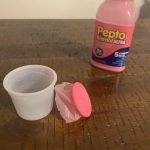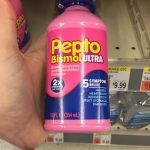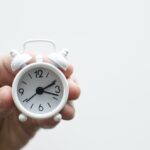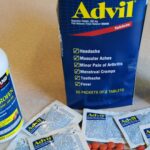How Long Does It Take For Pepto Bismol (Bismuth Subsalicylate) To Work?
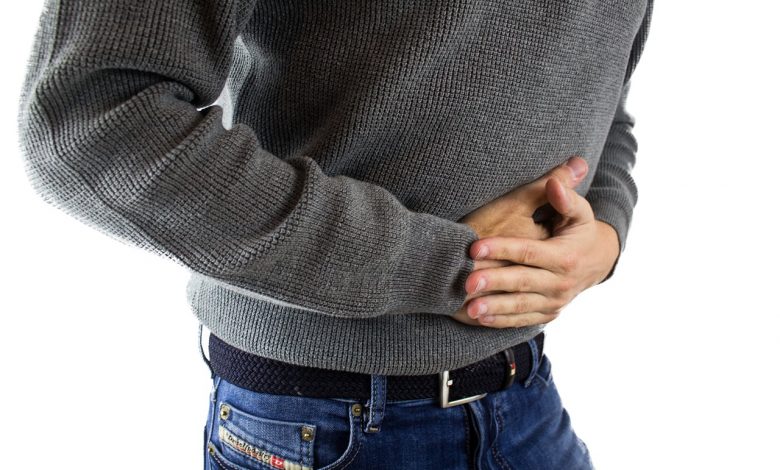
When our body begins to metabolize a medication, different organs process the ingredients before they are finally released into the bloodstream. While the process may sound straightforward, different drugs dissolve at different rates, different formulas, and dosages break down differently – and, everybody’s body metabolizes medication uniquely. These are just a few of the many complexities behind the nature of drug absorption and metabolism.
The vast majority of medications are taken orally and are broken down within the gastrointestinal tract. Once the medication arrives, it is broken down by stomach acids before it passes through the liver and then enters the bloodstream. Certain medications may stay in the bloodstream longer – it all depends on the dosage and drug family consumed.
There are several factors at play when determining the overall time required for medication to fully digest. The following factors all impact an individual’s sensitivity to and absorption of medication:
- Age
- Weight
- Gender
- Time of day taken
- Level of physical activity
- Level of stress
- Content of stomach and PH level
- Presence of other medications
Gastric acids may prevent or slow the breakdown of certain medications. Additionally, when a medication is metabolized in the liver, its potency will decrease along with its effectiveness before the therapeutic reaches the bloodstream.
What is Pepto-Bismol?
Pepto-Bismol is a brand of bismuth subsalicylate, a medication used for heartburn and acid reflux, indigestion, diarrhea, and feeling sick (nausea). According to a study published in the journal Clinical and Experimental Gastroenterology , bismuth only has antidiarrheal, antibacterial, and anti-inflammatory properties in the body. It works by protecting your stomach and the lower part of your food pipe from stomach acid. It is also a mild antacid, which helps reduce excess stomach acid and eases any discomfort.
In some cases, and always under a doctor’s guidance, people may use Pepto Bismol and other drugs to help treat infections caused by the bacteria H. pylori and symptoms that arise from them. Sometimes, a doctor may recommend it to treat symptoms of chronic digestive disorders.
Some people also find the antibacterial effects of Pepto Bismol useful when traveling to unfamiliar areas where the local bacteria may infect their digestive system and cause traveler’s diarrhea.
No one should self-diagnose an underlying issue and use Pepto Bismol to treat it. Anyone whose symptoms get worse or last more than 2 days should contact a doctor for a full diagnosis.
Pepto-Bismol comes as tablets and a liquid that you drink. You can only buy it from pharmacies.
How should I take Pepto-Bismol?
Use exactly as directed on the label, or as prescribed by your doctor. Shake the oral suspension (liquid) before you measure a dose. Use the dosing syringe provided, or use a medicine dose-measuring device (not a kitchen spoon).
You must chew the chewable tablet before you swallow it. Drink plenty of liquids while you are taking Pepto-Bismol.
Anyone taking Pepto Bismol to treat occasional digestive symptoms should follow the instructions on the label.
The original liquid Pepto Bismol includes a 30 milliliter (ml) cup, which is one dose, delivering 525 milligrams (mg) of bismuth subsalicylate. The Pepto Bismol website recommends taking:
- One 30 ml dose every 30 minutes as needed for stomach upset, nausea, heartburn, and indigestion
- One 30 ml dose every 30 minutes or two doses every hour for diarrhea or traveler’s diarrhea
It also warns not to take more than eight doses in 24 hours.
When using the original chewable tablets, one dose is two tablets. The recommended dose is:
- Two tablets every 30 minutes or four tablets every hour for diarrhea
- Two tablets every 30 minutes for stomach upset, nausea, heartburn, and indigestion
Similarly, do not take more than eight doses (16 tablets) in 24 hours.
Pepto Bismol Extra Strength is a more concentrated liquid but delivers the same amount of active ingredient per recommended dose — 525 mg of bismuth subsalicylate in 15 ml of liquid.
For children under the age of 12, use children’s versions of similar medications or talk to a doctor before using Pepto Bismol.
Do not take more than 8 doses in one day (24 hours). Call your doctor if you still have diarrhea after 2 days of using Pepto-Bismol.
This medicine can affect the results of certain medical tests. Tell any doctor who treats you that you are using Pepto-Bismol.
Store at room temperature away from moisture and heat. Do not freeze.
How long does it take for Pepto Bismol to work?
Following oral administration, bismuth subsalicylate hydrolyzes into bismuth and salicylic acid in the stomach. Pepto Bismol reaches plasma peak levels within one to two hours of taking the medication.
The full effects of Pepto-Bismol (bismuth subsalicylate) kick in within 30 to 60 minutes. You can have another dose after 30 to 60 minutes if you need to. You can take up to 8 doses in 24 hours. Most patients taking Pepto Bismol report seeing a positive therapeutic response within four hours of taking the drug. Symptoms of heartburn, acid reflux, indigestion, diarrhea, and nausea should subside within this period.
Pepto Bismol also comes in Caplets (2 caplets equals one dose) and Chewables (2 chewable equals 1 dose). For Pepto Bismol Ultra Caplets, 1 caplet equals 1 dose. All these forms of Pepto Bismol are equally effective and use the same active ingredient, bismuth subsalicylate.

